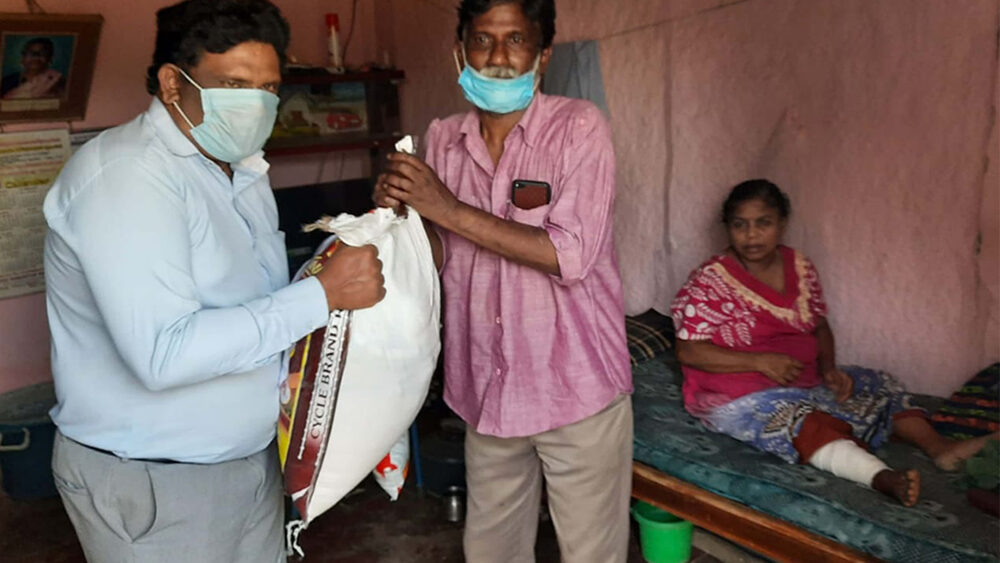Pastor “James” went to collect the food that the Indian central government is providing to needy families affected by the COVID-19 lockdown. But the distribution was organised by local Hindu extremist groups who dominate the government in the state where Pastor James lives. They refused to give him anything unless he renounced his faith in the Lord Jesus. Of course, Pastor James would not deny his beloved Saviour, so he went home empty-handed to his hungry family.
“Not for Christians”
When another Indian pastor and some of his congregation went for their government food rations, local Hindu extremists and police violently attacked the small Christian group and threw them out. They were told that the food was not meant for Christians.
Many Christians in India, as well as other parts of Asia and Africa earn their living in low-paid jobs, without regular salaries. These “daily wage earners” are paid only for each day’s work they do, as in the parable in Matthew (20:1-16).
When lockdown began, they lost their income. Too poor to have savings, they soon finished the meagre food stocks in their home. If they are prevented from getting government food aid, they have nothing. Lockdown for them is not about boredom and frustration – it is about real hunger, and the prospect of starvation.
Death by virus or by starvation?
“I would rather die from coronavirus than starvation,” said one African church leader, expressing the view of many who venture out of their homes in desperation to seek food.
Poor urban communities are also in extra danger of getting infected with the virus. Crowded together and with grossly inadequate water supplies, frequent hand-washing is next to impossible and there is no money to buy face masks or hand sanitisers.
But for rural communities, imagine the frustration of being unable to go to your little plot of land to harvest the crops you know are ready – and will soon be rotting if not gathered in. Some under lockdown are already eating the seed that they saved to sow for the next crop.
Many poor pastors depend completely on the offerings of their congregation but, without Sunday services, there are no offerings. In any case, their church members now have nothing to give.
Locusts, floods and virus make a triple tragedy
To make matters worse, parts of East Africa and Pakistan are suffering from locusts on a scale unknown for decades. The insects, now numbering in the trillions, devour the crops while subsistence farmers are locked down at home, unable to do anything to tackle the swarms. “Christians are now hopeless,” said an Ugandan bishop, “If there is no intervention in form of relief, many … are likely to lose their lives.”
It has also been a season of extreme rains in East Africa, causing floods and landslides which have killed about 250 people. In Kenya, there are at least 116,000 homeless people.
In this triple tragedy, the disasters impact each other. The huge numbers of displaced people are complicating the Kenyan government’s efforts to prevent the spread of coronavirus. At the same time, borders closed in the fight against coronavirus are delaying the delivery of pesticides to locust-affected areas in the region.
Lockdown targets for terrorism
In West Africa, Christians staying obediently in their homes are “sitting ducks” for terrorist attacks. The militants are also spurred on by the fact that governments have switched their resources to combatting COVID-19; this leaves the militants free to launch their anti-Christian attacks with impunity.
Some jihadi groups have even celebrated the new disease, describing the virus as a “small soldier of Allah” sent to attack his enemies.
The joy of saving forgotten lives
Barnabas Fund has already sent $1.45 million to save Christians affected by COVID-19 lockdown in 24 countries. This has provided food for 250,000 people, hygiene products for 14,000 and support to 6,400 pastors.
Join with us, and experience the joy of saving forgotten Christian lives.
$20 could make a real difference to a destitute Indian pastor.
$38 could provide flour, cooking oil, face masks and sanitiser for a family in Kenya.
Make a Donation
Can you help to save the “forgotten lives” impacted by COVID-19 and other disasters?

